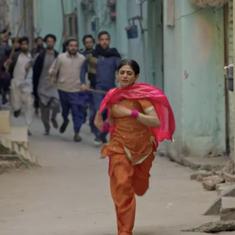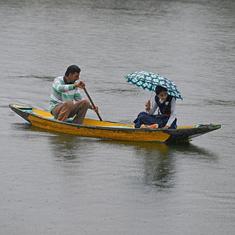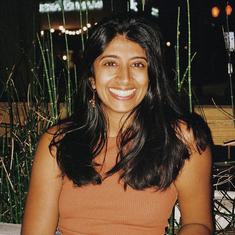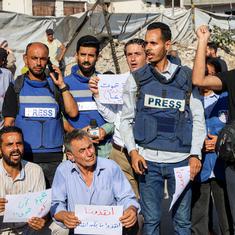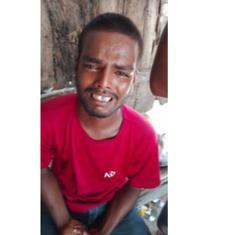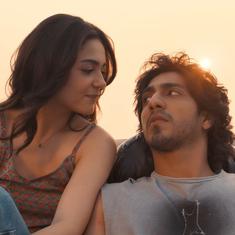Communal tensions that had been simmering in the Dakshina Kannada district for more than a month flared up again on July 7, when a Rashtriya Swayamswevak Sangh worker Sharath Madivala succumbed to injuries he had sustained in an attack three days earlier. Madivala, 28, was stabbed by unidentified assailants while he was leaving his laundry shop on BC Road in Bantwal Taluk on July 4.
On July 8, a funeral procession was taken out where thousands of right-wing activists marched with Madivala’s body, despite prohibitory orders being imposed in the area banning unlawful assembly. The procession took a violent turn as it crossed BC Road, after miscreants allegedly threw stones at the passing crowd. CCTV footage from the spot shows that participants in the procession retaliated.
The attack on Madivala came just two weeks after 35-year-old Ashraf Kalai, an auto rickshaw driver and Social Democratic Party of India worker, was dragged out of his vehicle and hacked to death by six people on June 21. Police officials suspect that Madivala’s murder was in retaliation to the attack on Kalai, which the Social Democratic Party of India had blamed on the Sangh Parivar.
But Bharatiya Janata Party leader Ganesh Karnik dismissed the claim. “The Sangh Parivar has nothing to do with Ashraf’s murder. Then how can it [Madivala’s murder] be a revenge killing?” he asked. “Hindus are being killed in Karnataka and the Congress government is making baseless claims.”
The police are yet to make any arrests in Madivala’s murder, but they claim to have some leads. In the Ashraf Kalai murder case, six arrests have been made. The accused in this case have a history of creating communal tension in Bantwal, said the Inspector General of Police (Western Region) Harishekharan.

‘We lost our son’
On Monday, Madivala’s father Thaniyappa and mother Nalini sat outside their home in Khandur village, as a steady stream of visitors came to offer condolences.
The old man couldn’t hide his grief when he began talking about his son. “Sharath was such a nice person. He never picked up fights with anyone, and the police haven’t registered any case against him,” he said. “I don’t know who killed him.”
Thaniyappa has been running a laundry shop in the town for 40 years and his son was started to help with the business a few years ago.
“I have friends in Hindu, Muslim and Christian communities, and I don’t hate any one,” he said. “Even Ashraf, who was killed on June 21, was my good friend. He used to greet me whenever he passed near my shop.”
Thaniyappa said he doesn’t trust the government will bring his son’s murderers to book. “The government is playing vote bank politics,” he said.
A deserted house
Ashraf’s house at Ammunje wore a deserted look on Monday. His brothers, Siddique and Shafeeque, still don’t know the reason for their brother’s murder. “Our brother didn’t attack anyone. He did a lot of good work for the society. We don’t know why he was killed,” said Siddique.
“He drove his autoriskshaw to make a living. He always spoke to people with a smile,” said the younger brother Shafeeque.
“The only party that is worried about the growth of SDPI [Social Democratic Party of India] is Sangh Parivar,” Shafeeque added. “When the incident happened, we were sure that it was done by Sangh Parivar. And we were proved right when the police arrested Sangh activists later. I am sure that truth will prevail.”
Stirring trouble
The government has accused the Sangh Parivar of taking advantage of an already tense situation to stoke communal tensions over RSS worker Madivala’s murder.
For more than 40 days now, Section 144 of the Criminal Procedure Code (banning unlawful assembly) has been in place in Bantwal, after a 21-year-old Muslim youth was killed in Kalladka village in Bantwal on May 26. The restrictions were then spread to other parts of Dakshina Kannada, which is headquartered in Mangaluru.
Ramanath Rai, the minister in charge of Dakshina Kannada, blamed the Sangh Parivar for fanning communal flames. Speaking about the funeral rally for Madivala, he said, “They took the youngster’s body on a procession from Mangalore to Bantwal [a 20-km distance]. It is done for political gains. Communal violence in Dakshina Kannada would end if Sangh Parivar stopped polarising the society on communal lines.”
But BJP’s Karnik said the decision to take out a procession had been a spontaneous one. “People poured in spontaneously,” he said. Don’t they have the right to pay respect to a Hindu brother who was killed by extremists? The minister is favouring only Muslims.”

Eye on polls
Though Dakshina Kannada is no stranger to communal flare-ups, the latest spell of violence comes ahead of the Assembly elections in Karnataka next year. The BJP, which had lost the state to the Congress in 2013, has already launched its campaign for the upcoming polls slated for May 2018. The law-and-order crisis in Dakshina Kannada has become the latest headache for the Siddaramaiah-led Congress government in Karnataka as it prepares for next year’s Assembly election.
I urge all citizens in Dakshina Kannada district to maintain peace & not flare up communal tensions or indulge in violence of any kind.
— CM of Karnataka (@CMofKarnataka) July 10, 2017
Those trying to politicise situatn for own intersts must recognise that damaging Ktaka's secular fabric is ultimately damaging to themselves
— CM of Karnataka (@CMofKarnataka) July 10, 2017
Under pressure to contain the situation, the Congress government increased security measures in Bantwal after Kalai’s murder and more than 1,000 personnel were deployed in sensitive areas that had witnessed communal clashes.

However, residents of the area accused the police of inefficiency. For instance, on Friday, a day before Madivala’s death, several hundred right-wing activists had gathered at BC Road to protest the attack on him, despite section 144 being imposed in the area.
Socialist Democratic Party of India activists alleged that the police were going soft on the instigators of violence to protect the RSS. “The police have a soft corner for Sangh Parivar people,” said Imtiyas, who was close to Kalai.
But Suresh Bhat B, district president of Karnataka Communal Harmony Forum blamed the Sangh Parivar for causing trouble. “Sangh Parivar had been using deaths to reap political benefits,” he said. “The scenario hasn’t changed even now.”
